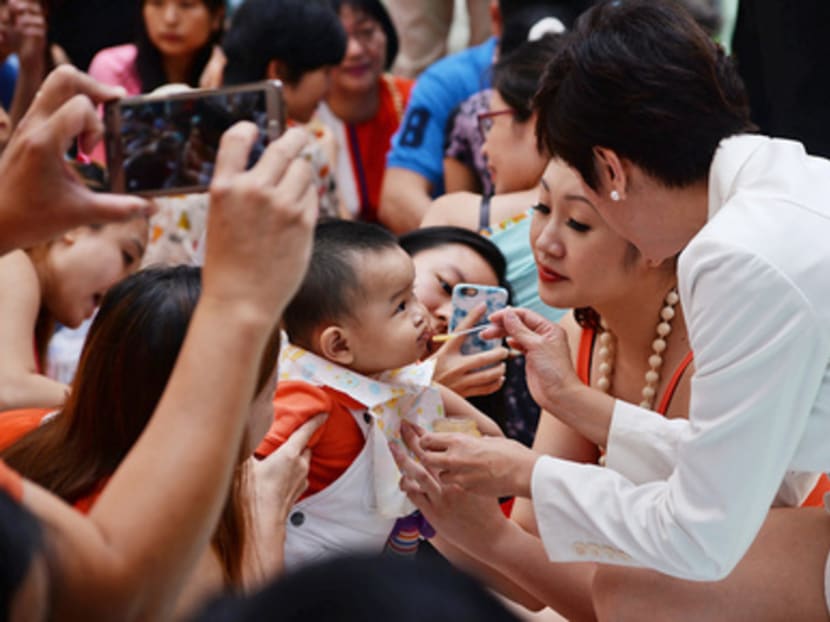Govt wants SMEs to give working mums more support: Josephine Teo
SINGAPORE — With the majority of young mothers, or about eight in 10, remaining in the workplace after having children, the Government wants to see companies here offer better support to this group, said Senior Minister of State (Prime Minister’s Office) Josephine Teo.

Mrs Josephine Teo (in white) at a Jubilee baby event held at Marina Square yesterday. Photo: Robin Choo
SINGAPORE — With the majority of young mothers, or about eight in 10, remaining in the workplace after having children, the Government wants to see companies here offer better support to this group, said Senior Minister of State (Prime Minister’s Office) Josephine Teo.
Revealing these figures to reporters at the sidelines of a parenting event on Mother’s Day yesterday, Mrs Teo said these mothers — aged between 25 and 39 — need help from fathers, employers, families and co-workers to meet family and work obligations.
For example, companies could allow alternative work arrangements for parents to care for their children. However, this also means that other colleagues have to chip in, she added.
“You need a workplace culture that is mutually supportive,” said Mrs Teo, who helps oversee the National Population and Talent Division.
Asked whether companies were doing enough to support young working mothers, Mrs Teo said the Government has received feedback from small and medium enterprises (SMEs), who recognise the importance of doing so.
“But very often, they don’t know how to get started. They think that supporting parents could be a very complicated affair,” said Mrs Teo.
For instance, she said, SMEs typically think such efforts require a lot of resources. But they can start with “easy things” such as colleagues covering each other’s duties if a parent wants to take emergency leave, said Mrs Teo.
Often, parents find it hard to respond to emergencies at home because the workplace is unclear about who is covering their duties, she noted.
Adding that new measures to support parents — among them more government-paid paternity leave —were announced during the Budget debate this year, Mrs Teo said: “All these are part of (our) effort to make parenthood achievable and enjoyable, but I think at the same time we have to be a society that celebrates parenthood.”
The Government will try to promote greater understanding of how employers, especially SMEs, can play a bigger role in supporting families.
Ms Cali Fay, who has two young kids — one eight months old and the other two and a half years old — and works in an SME, said her experience has been positive so far.
“They understand that I need to get home at a certain time,” said the 27-year-old, who works in an event company.
However, another woman, who only wanted to be known as Mrs Lim, said it will be hard for her to take emergency leave if her one-year-old child falls ill, as her company is too strict.
“I feel like they should be a bit more flexible to me as my son is still quite young,” said the 34-year-old.
Dr Carol Balhetchet, senior director and clinical psychologist for youth services at the Singapore Children’s Society, said companies have to understand what it is like for young mothers, as they have to juggle work and children.
Ms Evelyn Kwek, managing director of Great Place To Work Institute, said employees are too often expected to “compartmentalise the different roles they play”, and human resource policies can be better integrated.
“Beyond putting in place work-life policies, it is important there be a culture of respect for the individual and a culture that allows mums to be able to utilise these policies,” she said. “On the individual front, mums need to also acknowledge that there are other colleagues with different work-life needs, which are equally important.”
Mr Ching Wei Hong, council chairman of Families for Life, said flexi-work arrangements such as working from home and parental leave, and telecommuting arrangements are some initiatives companies can adopt.
“Many families in Singapore face multi-faceted challenges, and juggling the responsibilities of work with the duties of raising a family are among the difficulties many parents in Singapore face,” he noted.






